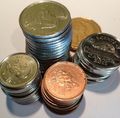If you enjoy the crisp feeling of a new paper bill, be
warned, it might soon be a thing of the past with England joining the list of
countries switching over its currency to plastic bills.
The Bank of England is taking its five and 10 pound bills on
a roadshow to 50 public events to see what its residents have to say about the
new bills within two months. They hope to have a final decision on the notes by
December and the new bills could be implemented as early as 2016.
While it's expensive to switch over paper notes to plastic
ones, there are a few key benefits such as the bill lasting longer, the bill
staying cleaner since stains can be wiped off and most importantly, the new
bills protects the country from
counterfeiters. The durability will help in the long run since that means there
will be less production costs in the future, the deputy governor of the Bank of
England told BBC.
Australia was the first country to introduce polymer bank notes
into circulation in 1988. Canada only introduced the polymer bills into
circulation since 2011, but countries such as Mexico, Singapore and New Zealand
also use plastic bills.
And while the bills may last longer, money is still touched
by many people carrying all kinds of germs. A recent study suggested that polymer
notes could be a "breeding ground" for superbugs with the notes
carrying a trace of the bug for 21 hours longer than other non-polymer
currencies. That old saying of always wash your hands before eating is really
good advice, especially after you've handled money.
Hopefully when England releases its polymer bills, it'll be
smoother than some of the issues Canada has faced. A few months ago, Canadians
wondered whether their bank notes had a secret scratch and sniff scent of maple
syrup, which was denied by the Bank of Canada. There was also an outcry over the government's use of the Norwegian maple instead of the Canadian maple
on the $20 bill and the rejection by focus groups of an Asian-looking woman on the
$100 note.
While all the reasons about bills surviving a dip in a lake
or being harder to tear are great, it's mainly important to see how well the
bills are preventing counterfeiters. Of course, there are always people trying
to forge money and counterfeits of the $100 bill were discovered in
Westminster, B.C., in mid-May. But all in all, detected counterfeit bills have dropped
and sits at its lowest level in years, according to the Globe and Mail. That's
all we want our bills to do and hopefully it really is much harder to replicate
these new bills.
Have you found a
counterfeit bill? What did you do about it?





